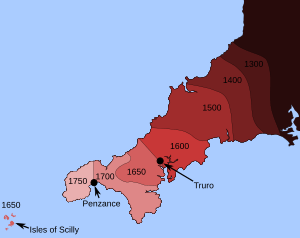Cornish dialect facts for kids
Quick facts for kids Anglo-Cornish |
|
|---|---|
| Cornish English | |
| Native to | United Kingdom |
| Region | Cornwall |
| Native speakers | unknown (as at 2011) (date missing) |
| Language family | |
Anglo-Cornish is a special way of speaking English in Cornwall, a county in the southwest of England. It's also known as Cornish English or Cornish dialect. This dialect is spoken by Cornish people.
What makes Anglo-Cornish unique? It's influenced by the old Cornish language. This means it uses some words and grammar rules that come from Cornish. The Cornish language is a Celtic language, like Welsh and Breton. Besides special words and grammar, people in Cornwall also have different accents depending on where they live.
Contents
How Anglo-Cornish Developed
English speakers first arrived in Cornwall around the 900s. These were Anglo-Saxon settlers. They mostly settled in the northeast parts of Cornwall, near the Ottery and Tamar rivers. You can still find old place names from this time that are English.
The spread of English slowed down after the Norman Conquest in 1066. This was because Norman French became the main language for official business. Also, people in Cornwall often talked with people in Brittany, who spoke a similar Celtic language. This helped keep the Cornish language strong.
But by the 1200s and 1300s, English started to be used more for official things again. People also began writing stories and poems in Middle English. These changes likely helped English spread more in Cornwall. In the 1500s, things like a new English prayer book, and no Cornish Bible, led to more people speaking English instead of Cornish.
Anglo-Cornish Around the World
Many Cornish people moved to other countries in the 1800s and 1900s. They went to places like North America, Australia, and South Africa. When they moved, they took their way of speaking English with them.
For example, some Aboriginal people in South Australia, especially the Nunga, are said to speak English with a Cornish accent. This is because Cornish miners taught them English. Many towns in South Australia even had newspapers that included parts written in the Cornish dialect. Some Cornish words, like "fossick" (to search for gold) and "nugget" (a lump of gold), even became part of Australian English.
Keeping Anglo-Cornish Alive
Over time, fewer people spoke the Cornish dialect. When Cornish children started going to school in the late 1800s, teachers often encouraged them to speak "proper" English. Some people thought that speaking the dialect meant you weren't as smart or educated. This led to fewer people using the dialect.
In the 1900s, many people moved to Cornwall from other parts of England, especially near London. These new residents didn't speak the Cornish dialect and sometimes found it hard to understand. To make communication easier, Cornish people sometimes spoke the dialect less.
Even though fewer people speak it today, there have been efforts to save the Cornish dialect. Groups like the Old Cornwall Society wrote down the dialect and made audio recordings. This helps make sure that this unique way of speaking isn't lost forever.
Anglo-Cornish in Books
People have written many different types of literature in the Cornish dialect. You can find books, short stories, and even poetry written in this special way of speaking.
Images for kids
 | Laphonza Butler |
 | Daisy Bates |
 | Elizabeth Piper Ensley |




